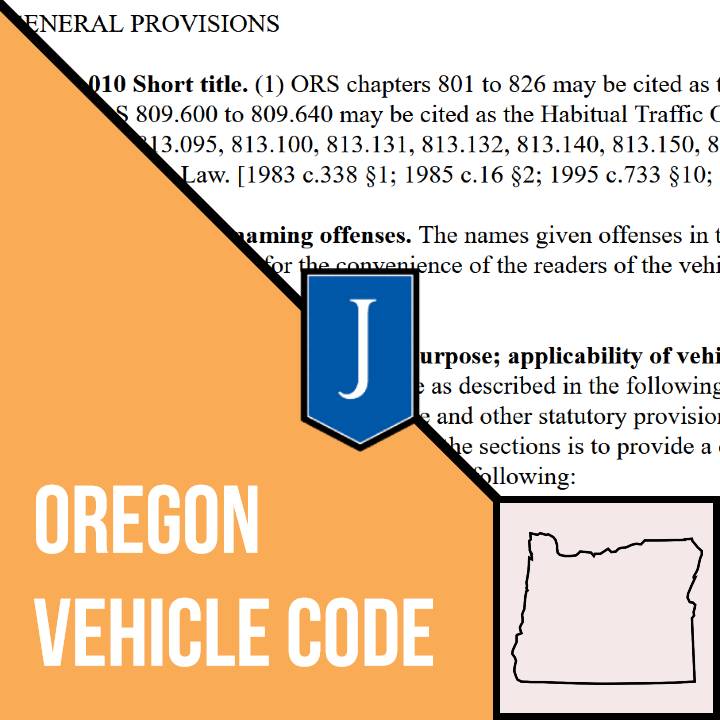Oregon Vehicle Code
The Oregon Vehicle Code is chapters 801 to 826 of the Oregon Revised Statutes (ORS). Read our blog post on Oregon Law if you're unfamiliar with the ORS. These laws are important to every Oregonian driver. They are particularly important if you have been in an accident and have a personal injury claim. However, understanding the law can be difficult. As such, this blog series will serve to provide useful information on the Oregon Vehicle Code.

Defining The Vehicle Code
First off, how do we even know what parts of the ORS are the actual Oregon Vehicle Code? Well, Oregon law actually defines chapters 801 to 826 of the ORS as the Oregon Vehicle Code. Here is the relevant portion:
ORS chapters 801 to 826 may be cited as the Oregon Vehicle Code.
ORS 801.010(1)
It may also help to know how to read cited Oregon laws. The Oregon Appellate Court has a convenient style manual to help with this. Here is an excerpt:
Numbered paragraphs within a section are referred to as subsections,
Oregon Apellate Court Style Manual (Updated 2022) Page 35
lettered paragraphs as paragraphs. For example, ORS 305.220(1)(a) would be
referred to in text individually as paragraph (a) of subsection (1), when referring to
(1)(a) collectively, use paragraph (1)(a).
Oregon Vehicle Code Chapters
As previously stated, chapters 801-826 are considered to be the Oregon Vehicle Code. To get started, here are the chapter numbers and titles. Additionally included are some brief notes:
OREGON VEHICLE CODE
Chapter 801. General Provisions and Definitions for Oregon Vehicle Code
Notes: This chapter sets the foundation for subsequent chapters by defining various terms and setting general provisions. For example, ORS 801.050 grants motorists the privilege of driving on Oregon's highways.
Chapter 802. Administrative Provisions
Notes: These are laws for administering the Oregon Vehicle Code. This chapter contains rules for handling fees and transferring information between agencies among other rules.
Chapter 803. Vehicle Title and Registration
Notes: Chapter 803's laws cover getting a title and registering a vehicle. This chapter includes license plate requirements and title replacement fees.
Chapter 805. Special Registration Provisions
Notes: These laws are for things like special registration for disabled veterans and antique vehicles. Also, these laws cover rules and fees for special license plates.
Chapter 806. Financial Responsibility Law
Notes: This is the part of the vehicle code that requires you to have car insurance. This chapter is very important for personal injury law. Forgoing insurance can have a major impact on what money can be recovered in a personal injury claim.
Chapter 807. Driving Privileges and Identification Cards
Notes: These laws cover the different types of driving licenses and the penalties for driving without an appropriate license. Endorsements for different vehicle types are also covered in this chapter.
Chapter 809. Refusal, Suspension, Cancellation and Revocation of Registration, Title, Driving Privileges and Identification Card; Vehicle Impoundment
Notes: Other laws state when and how licenses, titles, and IDs are given. These laws state when and how they can be taken away.
Chapter 810. Road Authorities; Courts; Police; Other Enforcement Officials
Notes: These laws cover who controls what roads and in what locations. For example, it gives local road authorities the right to create crosswalks within their jurisdiction.
Chapter 811. Rules of the Road for Drivers
Notes: These laws are about how to drive legally. As the title states, these are the Oregon rules of the road. This includes instructions such as when to yield or penalties for speeding.
Chapter 813. Driving Under the Influence of Intoxicants
Notes: The drunk driving laws are in this chapter. This chapter also includes penalties for refusing a test for intoxicants.
Chapter 814. Pedestrians; Passengers; Livestock; Motorized Wheelchairs; Vehicles With Fewer Than Four Wheels
Notes: This chapter has laws covering many of the rights and responsibilities of pedestrians and other non-typical road users. The laws regarding livestock are particularly important in rural environments.
Chapter 815. Vehicle Equipment Generally
Notes: These laws cover requirements for various pieces of a car such as brakes and seatbelts. It also sets the foundation for creating testing standards to evaluate the various pieces of equipment.
Chapter 816. Vehicle Equipment: Lights
Notes: There are many different types of lights used on vehicles and these laws cover their use. This includes things you may not think of such as police lights, school bus stopsigns, and reflectors.
Chapter 818. Vehicle Limits
Notes: Different vehicle classes have different size and weight limits. These laws cover those limits as well as the related enforcement mechanisms.
Chapter 819. Destroyed, Totaled, Abandoned, Low-Value and Stolen Vehicles; Vehicle Identification Numbers; Vehicle Appraisers
Notes: Having a car totaled is important in personal injury cases. These laws cover a lot of how that is handled.
Chapter 820. Special Provisions for Certain Vehicles
Notes: Special rules for special vehicles, like school buses and ambulances.
Chapter 821. Off-Road Vehicles; Snowmobiles; All-Terrain Vehicles
Notes: These are the special laws covering vehicles mostly intended for off-road use. For example, there are rules for acquiring a snowmobile permit.
Chapter 822. Regulation of Vehicle Related Businesses
Notes: These are the rules covering towing companies, car dealerships, and other vehicle-related businesses. For example, one law covers acting as a vehicle dealer without a certificate as a class D misdemeanor.
Chapter 823. Carrier Regulation Generally
Notes: This chapter covers governmental regulation of motor carriers (trucks and trains).
Chapter 824. Railroads
Notes: This chapter covers laws for trains which are indeed vehicles, just very large vehicles.
Chapter 825. Motor Carriers
Notes: These are the laws that cover truck drivers and other motor carriers.
Chapter 826. Registration of Commercial Vehicles
Notes: This chapter covers the registration of commercial vehicles and importantly allows for proportional registration. Proportional registration allows paying registration fees, taxes or other fixed fees proportionally to where a commercial vehicle is operated.
Oregon Vehicle Code and Injury Claims
If you're facing a personal injury matter that involves the Oregon vehicle code consider contacting our law firm. Our attorneys have a proven track record of obtaining more money for our clients than they could have gotten on their own. Don't miss a deadline or leave money on the table. Call us to learn how you can become another one of our success stories.
We will review your case for free.
Pay us nothing unless we get you a better settlement.
We work on contingency.

